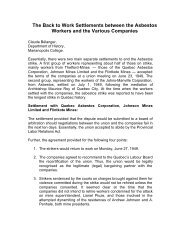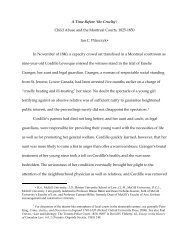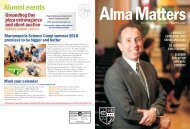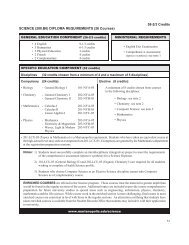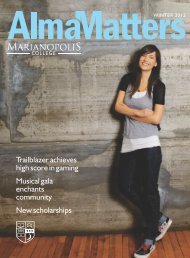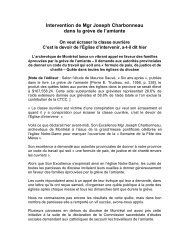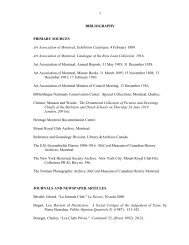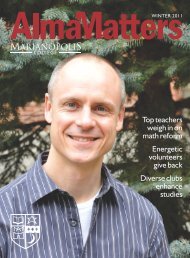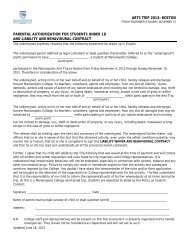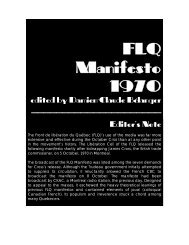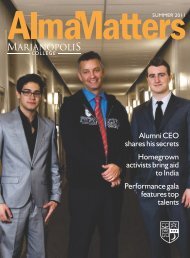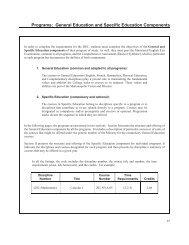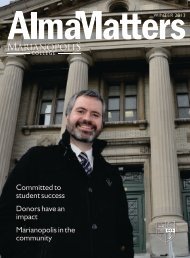Social Science: Anthropology - Biology - EconomicsAnthropology (381)Anthropology is the study of humandiversity across both time and place.Encompassing both biological andsocio-cultural approaches,anthropology as a social scienceoffers a broad understanding of howvarious human populations havephysically and culturally adapted totheir particular historical andenvironmental contexts. Topics inanthropology range from humanevolution and prehistoric peoples, tothe study of contemporary societiesand cultural experiences.Humans: From Stone Age to SpaceAge381-900-MS (3-0-3) 2 credits(Introductory Course)To understand humans we must investigateall aspects of their lives: body,society, economy, religion, language,past and present. The ways in whichthese affect one another and worktogether is our particular concern.Students build an overview of theroles these play in the lives of people,and how they have changed from theearliest makers of stone tools to the21st century, in all parts of the world.Native Peoples of North America381-913-MS (3-0-3) 2 creditsExamines the cultures of theaboriginal people of our continent,from the Inuit of the Arctic to theAztec of Mexico. Students consider:economy, government, family,religion and environment, and theways in which these influence oneanother and work together. Theirhistory is traced: from small bands ofhunter-gatherers, to their building ofgreat cities, to their roles in modernnations.68Individual Topics In Anthropology381-916-MS (3-0-3) 2 creditsOffered as an Independent Studyoption. Students must consult withand obtain written permission fromthe supervising instructor prior toregistering for this course. Any issueof interest may serve as the coursefocus.Biology (101)The study of biology is concernedwith living organisms, their diversity,evolution and structure and functionat the cellular and organismal level.It includes the study of genetics,population genetics, and ecologicalinteractions.Human Biology101-921-MS (3-0-3) 2 creditsFor students in the Psychology profileonly.The regulatory mechanisms of thehuman organism, the endocrine andnervous systems are investigated.Other topics include: molecules andnutirition, cell structure and organellefunction, meiosis and mitosis in thehuman life cycle, and moleculargenetics. Mendelian genetics andheredity are also covered.Economics (383)Economics is the study of choice. It isthe study of how the society(individuals, businesses and thegovernment) allocates scarceresources and how people react toeconomic incentives.Macroeconomics383-920-MS (3-0-3) 2 credits(Required Course)This course investigates the nationaleconomy as a whole. Students studywhat is the nation’s wealth and howto measure it; what is unemploymentand how to reduce it; how theeconomy grows over time; how theeconomy moves through businesscycles and how government policiescan stimulate the economy.Microeconomics383-921-MS (3-0-3) 2 creditsMicroeconomics focuses on arepresentative consumer and arepresentative firm. Students studyhow consumers make their buyingdecisions. Students also examine twomajor choices that each firm has tomake: how much to produce and howmuch to charge. Students investigatehow market prices are set; how pricecontrol distorts the markets; and whyfirms set different prices for differentcustomers.International Economics383-924-MS (3-0-3) 2 creditsThis course introduces students to thebasic principles of international tradeand international finance. Studentsstudy such topics as exchange rates,balance of payments, the theory ofcomparative advantage andinternational economic cooperation.Money and Banking383-925-MS (3-0-3) 2 creditsThe primary objective of this courseis to introduce a field known asmonetary economics to the studentwho has already become acquaintedwith the introductory principles ofeconomics. It is hoped that thiscourse will further broaden and enrichthe student’s understanding ofeconomic principles and theory.Topics to be covered include: theorigin, evolution, and functions ofmoney, the structure, organization,and functions of commercial banks;
Social Science: Geography - Historythe central bank and monetarycontrol; financial markets and nonbankfinancial institutions; monetarytheory and policy; money and theinternational economy.Geography (320)Geography overlaps the traditionalboundaries of the physical and socialsciences. It is an integrative field ofknowledge that deals with the study ofthe world's physical, cultural,political and economic patternsresulting from the location andspatial interaction of differentphenomena. Geographic study buildson the fields of earth science, naturalresources and environmentalmanagement, human-ecologicalsystems, population, economicdevelopment, geopolitics, regionalinequalities and social justice, andurban and regional planning toanswer important questions about theforces that shape our world.World Geography320-103-MS (2-1-3) 2 credits(Introductory Course)Where? Why there? Why care? Thiscourse provides a comprehensiveview of the world through the studyof the distinctive traits thatcharacterize the planet's highlydiverse and yet intimately interconnectedplaces and regions. Aspatial and systematic approach istaken to analyze and build connectionsbetween important physical systems(i.e. landforms, climates) and humanphenomena (i.e. settlement patterns,inequality). In doing so, studentsare encouraged to ask the deeperquestions about the physical, cultural,economic and political patterns thatshape our world.Environmental Geography320-215-MS (2-1-3) 2 creditsLandscapes can tell us a lot about thepeople who produced them. Throughthis course, students will learn to reada landscape in order to uncover theforces and motivations that led to itstransformation. The goals of thiscourse are to show how humanactivity contributes to the transformationof the natural environment; toidentify and analyze the criticalfactors associated with global change;and to explore the very complex andinterrelated socio-economic, culturaland ecological factors that influencethe relationship between humans andthe environment. By asking thedeeper questions, emphasis is placedupon elaborating sustainable (albeithypothetical) solutions to theenvironmental problems facingmajor world regions.History (330)History is the study of the past, with aview to understanding the present. Thestudy of history provides students witha broad base of knowledge leading toan understanding of the complexity ofthe human experience through time.History courses encourage students toask questions about past and presentsocieties and consider social dynamicsin historical context. Students learnhow to synthesize and analyzeinformation, improving their literacyand communication skills. Emphasis isplaced on the multiple interpretationsof the defining moments in local,national and world histories.History of Western Civilization330-910-MS (3-0-3) 2 credits(Required Course)This course presents an overview ofthe evolution of western civilization:the historical roots and evolution ofpolitical, economic, social andreligious institutions; the majorpolitical ideologies, the cultural andintellectual heritage of the West andthe development of the Europeancompetitive-state system. Some ofthe aspects introduced include: theAncient and Medieval worlds, theRenaissance, the Reformation, theEnlightenment, the Age ofRevolutions, the IndustrialRevolution, 19th-century and20th-century ideologies, overseasimperialism, and the First and SecondWorld Wars.Canadian History330-925-MS (3-0-3) 2 creditsThis course considers the long-termevolution of Canada to today. Themain emphasis is on the acquisitionof the factual, interpretative andconceptual tools to understand currentissues in Canada. Emphasis is placedon regional inequalities, native issues,minority and individual rights, thefederal system and its evolution,Canadian-American relations, socialreform and the development of thewelfare state, the history ofimmigration and multiculturalism.Quebec History330-951-MS (3-0-3) 2 creditsThis course examines the historicalevolution of Quebec sinceConfederation. The objective of thecourse is to acquire the elementsnecessary to understand the issuesfacing us today. Emphasis is placedon the development of nationalismand its many facets, on the traditionalsociety of Quebec and the manychanges brought by the QuietRevolution, on the demographicevolution and the language issue andon the history of the anglophonecommunity in Quebec.69
- Page 2 and 3:
VISIONMarianopolis College, drawing
- Page 4 and 5:
GENERAL INFORMATION: Introduction t
- Page 6 and 7:
AdmissionsOUT-OF-PROVINCEAPPLICANTS
- Page 8 and 9:
Financial Information• Birks Fami
- Page 10 and 11:
Financial InformationConfirmation F
- Page 12 and 13:
Academic Information• Failure (EC
- Page 14 and 15:
Academic InformationThose who are a
- Page 16 and 17:
Rules and Regulationsand whether su
- Page 18 and 19:
EDUCATIONAL RESOURCES & SERVICESAss
- Page 20 and 21: Educational Resources and ServicesS
- Page 22 and 23: CHOOSING A PROGRAMDiploma Programs
- Page 24 and 25: CertificatesSpecial InterestCertifi
- Page 26 and 27: Programs: General Education and Spe
- Page 28 and 29: General EducationGENERAL EDUCATION
- Page 30 and 31: General Education: Englishidentifyi
- Page 32 and 33: General Education: Englishas the fi
- Page 34 and 35: General Education: Englishintended
- Page 36 and 37: General Education: Frenchand curren
- Page 38 and 39: General Education: Frenchce cours t
- Page 40 and 41: General Education: HumanitiesHumani
- Page 42 and 43: General Education: Humanitiesunders
- Page 44 and 45: General Education: Humanitiespracti
- Page 46 and 47: General Education: Humanitiespracti
- Page 48 and 49: General Education: Physical Educati
- Page 50 and 51: General Education: ComplementaryCom
- Page 52 and 53: General Education: ComplementaryMod
- Page 54 and 55: SECTSpecificEducation Component- Sc
- Page 56 and 57: Science: Biology - ChemistryBiology
- Page 58 and 59: Science: Mathematics - PhysicsR and
- Page 60 and 61: 56-2/3 to 58 CreditsSOCIAL SCIENCE
- Page 62 and 63: Social Science: Profiles - General
- Page 64 and 65: Social Science: Psychology ProfileE
- Page 66 and 67: Social Science: Law, Society and Ju
- Page 68 and 69: Social Science: Honours CommerceHon
- Page 72 and 73: Social Science: History - Mathemati
- Page 74 and 75: Social Science: Political Sciencedi
- Page 76 and 77: Social Science: Religion - Sociolog
- Page 78 and 79: 54-2/3 CreditsCREATIVE ARTS, LITERA
- Page 80 and 81: Creative Arts, Literature and Langu
- Page 82 and 83: Creative Arts, Literature and Langu
- Page 84 and 85: Creative Arts, Literature and Langu
- Page 86 and 87: Creative Arts, Literature and Langu
- Page 88 and 89: Creative Arts, Literature and Langu
- Page 90 and 91: Creative Arts, Literature and Langu
- Page 92 and 93: 58-2/3 CreditsMUSIC (501.A0) DIPLOM
- Page 94 and 95: MusicEar Training and Theory IV551-
- Page 96 and 97: 59-1/3 CreditsARTS AND SCIENCES (70
- Page 98 and 99: Arts and Sciences: English - Humani
- Page 100 and 101: Arts and Sciences: Art History - Ar
- Page 102 and 103: Arts and Sciences: Mathematics - Mu
- Page 104 and 105: Arts and Sciences: Multidisciplinar
- Page 106 and 107: 56-2/3 to 58 CreditsLIBERAL ARTS (7
- Page 108 and 109: Liberal Artsof evolution; the first
- Page 110 and 111: Liberal ArtsOptionalIn addition to
- Page 112 and 113: Teaching FacultyFLEISCHER, George T
- Page 114 and 115: Teaching FacultyTRILLER, Bernice Sh
- Page 116: INDEX II: Programs and CoursesGener



